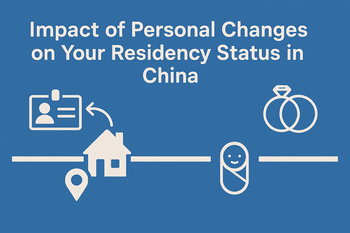
Navigating China’s visa and residency system can feel like walking a tightrope—especially when life throws curveballs like job changes, marriage, or moving houses.
Any personal change has the potential to invalidate your current permit, trigger fines, or even lead to deportation if unreported.
This guide breaks down the most common scenarios, outlines the necessary steps to stay compliant, and shows you how to safeguard your legal status in China.
1. Overview of China’s Residency Permits
China’s residency framework is built around your reason for entering the country.
The main categories include:
- Z-Visa (Work Permit + Residence Permit)
For foreigners employed by Chinese entities. - X-Visa (Study Permit + Residence Permit)
For full-time academic programs. - S-Visa (Family/Reunion Permit)
For family members of work/study visa holders, and private affairs. - Q-Visa (Family Reunion)
Q1 for long-term (marriage, dependent minors), Q2 for short visits. - Permanent Residence (“Chinese Green Card”)
Unlimited stay, akin to a green card, but does not confer citizenship.
Each permit carries specific entry requirements, expiration dates, and conditions.
When your personal situation shifts, you must adjust your permit accordingly—often within 10 days of the change.
2. Common Personal Changes & Their Impacts
| Personal Change | Impact on Permit | Action Required |
|---|---|---|
| Job switch or promotion | Original work permit no longer valid | 1. Apply for new Z-visa/work permit 2. Update PSB record |
| Employer termination | Residence permit tied to employer ends | 1. Leave China or 2. Convert to another visa category |
| Marriage to Chinese/PR holder | Eligible for Q1 visa; foundation for PR | 1. Apply for Q1 (long-term) visa 2. After 5 yrs apply for PR |
| Divorce | Spouse-dependent permit may expire | 1. Switch visa type 2. Update local Exit-Entry bureau |
| Birth of child in China | Child needs own visa (Q2 or X) | 1. Register birth with PSB 2. Apply for child’s permit |
| Address change | PSB registration out of date | Report new address within 24 hrs to local PSB office |
| Criminal record | Risk of permit cancellation | May lead to deportation or PR revocation |
2.1 Employment Changes
Why It Matters
Your Z-visa and residence permit are sponsored by your employer. When you switch jobs or get a promotion that changes your job title or work location, the permit you hold no longer reflects your status.
Steps to Comply
- New Work Permit Application
Submit a new “Notification Letter of Foreigner’s Work Permit” via your new employer. - Residence Permit Update
Within 10 days of entry under the new work permit, file a residence permit change at the local Exit-Entry Administration.
Timeframe
- Employer change: within 30 days of new contract.
- Address update: within 24 hours of moving.
2.2 Marital Status Changes
Marriage to Chinese Citizen or PR Holder
- Switch from X/S/Z categories to Q1-visa (long-term family reunion).
- Eligibility for Permanent Residence opens after:
- 5 consecutive years of marriage,
- ≥9 months of residence in China each year,
- Stable income and housing.
Divorce
- Your Q1/Q2 permit may lose validity.
- Options:
- Convert to a work (Z) or student (X) visa if eligible.
- Exit China, re-enter under a new sponsor.
2.3 Family Composition & Dependents
Birth of a Child
- Register the birth certificate with the local Public Security Bureau (PSB).
- Apply for your child’s Q2 (short-term) visa or X (if schooling).
Elderly Dependents
- Parents over 60 with no direct relatives abroad may apply for PR if they’ve lived in China ≥5 years (≥9 months/year), and have stable support and housing.
3. Pathway to Permanent Residence
If you’re eyeing China’s coveted “Green Card,” you must meet strict criteria under the Measures for the Administration of Examination and Approval of Foreigners’ Permanent Residence:
- Economic Contributor
• Direct investment with 3 years of good tax records. - Talented Professional
• Senior-level title or four years of high salary & residence. - Exceptional Contributor
• Special skills or achievements vital to China. - Family-Based
• Spouse of Chinese citizen/PR: 5 years married + residence. - Aging Parent
• ≥60 years old, no relatives abroad, 5 years residence.
Once approved, your Permanent Residence Card becomes your primary ID and simplifies travel, work, and investment in China.
4. Tips to Stay Compliant
- Keep Copies
Always have both physical and digital copies of your passport, visa, and residence permit. - Calendar Alerts
Set reminders for permit renewals, address updates, and work permit changes. - Legal Liaison
Collaborate with your employer’s HR or an immigration lawyer to handle paperwork. - Timely Reporting
Report any change—address, employment, marital status—within allotted windows (24 hrs–30 days). - Health & Conduct
Undergo required health checks and obey local laws to avoid visa cancellation.
5. Conclusion
Life is constantly changing, and China’s residency system moves just as dynamically.
Whether you’re climbing the corporate ladder, tying the knot, or welcoming a new family member, understanding how these shifts impact your visa is non-negotiable.
Stay proactive, keep documentation up to date, and consult professionals when in doubt.
That’s the key to turning China into a seamless—and worry-free—home away from home.
Sources & External Links
- National Immigration Administration: Guidelines for Approval of Foreign Nationals’ Eligibility for Permanent Residence in China
- Measures for the Administration of Examination and Approval of Foreigners’ Permanent Residence in Mainland China: RegistrationChina.com
- The Expat’s Guide to China Permanent Residence (Green Card): ExpatDen



